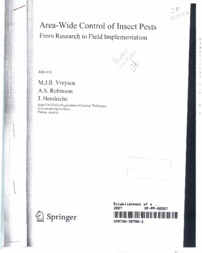Establishment of a mediterranean fruit fly Ceratitis capitata, fruit fly parasitoids, and codling moth Cydia pomonella rearing facility in North-eastern Brazil.
Establishment of a mediterranean fruit fly Ceratitis capitata, fruit fly parasitoids, and codling moth Cydia pomonella rearing facility in North-eastern Brazil.
Author(s): MALAVASI, A.; NASCIMENTO, A. S.; PARANHOS, B. J.; COSTA, M. L. Z.; WALDER, J. M. M.
Summary: The Mediterranean fruit fly Ceratitis capitata (Wiedemann) is a major pest of fruit crops worldwide and its presence in many countries poses a threat for production and export. The methodology that has been integrated in many countries to contain, to eradicate, or to suppress Mediterranean fruit fly species of quarantine importance are also important pests affecting fruit crops in Brazil. Parasitoids that are natural enemies of fruit flies will be mass-reared, together with Mediterranean fruit fly and Anastrepha species in the facility that is being established in Juazeiro, Bahia with the objective of suppressing fruit flies in the expanding commercial fruit production areas in the São Francisco river region. To take advantage of the availability of a large complex of buildings, the facility will eventually also produce sterile codling moth Cydia pomonella (L.), a pest recently introduced into southern Brazil, where it threatens the continuously growing apple and pear industries. The production of sterile Mediterranean fruit flies and sterile codling moths, as well as sterile host larvae for natural enemy production, will use gamma radiation as the sterilization method. The area-wide integrated pest management (AW-IPM) approach, including the release of these beneficial insects in the field, is the most effective means to control (suppress or in some situations even eradicate) such pests. The consumption of fresh fruits has increased worldwide and production in Brazil, either for domestic or export markets, has been intensified in the last decade. As food safety is becoming a major concern for consumers, the use of enviroment-friendly technologies such as the SIT will be increasingly required. The final clients for the sterile flies and moths will be the fruit growers. The foreseen weekly production of 200 milion sterile Mediterranean fruit flies and 10 milion Diachasmimorpha longicaudata (Ashmed) wasps will be released in the tropical fruit-growing areas of northern Brazil: Bahia, Pernambuco (São Francisco Valley), Ceará, north of Minas Gerais and north of Espirito Santo. The sterile codling moths would be sent by air to the apple and stone fruit production areas in the south of Brazil, Rio Grande do Sul and Santa Catarina, where this pest species is still confined to urban areas and hence amenable to eradication.
Publication year: 2007
Types of publication: Book sections
Unit: Embrapa Cassava & Fruits
Observation
Some of Embrapa's publications are published as ePub files. To read them, use or download one of the following free software options to your computer or mobile device. Android: Google Play Books; IOS: iBooks; Windows and Linux: Calibre.
Access other publications
Access the Agricultural Research Database (BDPA) to consult Embrapa's full library collection and records.
Visit Embrapa Bookstore to purchase books and other publications sold by Embrapa.

